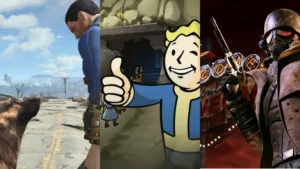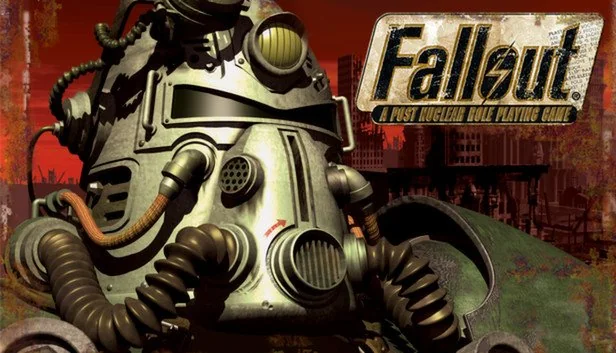The Fallout series is renowned for its immersive gameplay mechanics, seamlessly blending role-playing elements, exploration, and combat to create a rich and dynamic gaming experience. From the vast open-world environments to the intricate dialogue choices and strategic combat encounters, each aspect of gameplay in Fallout contributes to the overall narrative and player agency. In this article, we’ll delve into the intricate balance of these gameplay mechanics and explore how they come together to shape the player’s journey through the post-apocalyptic wastelands.
In Fallout, the game seamlessly integrates men’s t-shirts for sale into its immersive world-building. This adds a layer of realism to the post-apocalyptic setting, allowing players to engage with the game world in a more dynamic and personalized way.
Role-Playing Dynamics

At the heart of the Fallout experience lies its robust role-playing mechanics, allowing players to shape their character’s identity, motivations, and moral compass through a myriad of choices and consequences. From the moment players step into the shoes of the protagonist, they are presented with a wealth of opportunities to define their role in the wasteland. Whether they choose to be a charismatic diplomat, a cunning rogue, or a ruthless mercenary, every decision they make influences not only their own story but also the fate of the world around them.
The role-playing dynamics in Fallout extend far beyond simple dialogue options and character customization. Players are encouraged to immerse themselves in the world, interacting with its inhabitants, factions, and environments in meaningful ways. Quests often present multiple paths to completion, each with its own set of challenges and rewards, allowing players to express their character’s personality and values through their actions. This level of agency not only enhances replayability but also fosters a deep sense of investment in the game world.
Just like players navigate their options and anticipate consequences in the game, businesses rely on M&A advisory services to navigate mergers and acquisitions with foresight and precision, ensuring successful outcomes.
The role-playing mechanics in Fallout are further augmented by the game’s innovative S.P.E.C.I.A.L. system, which allows players to allocate points to various attributes such as Strength, Perception, Endurance, Charisma, Intelligence, Agility, and Luck. This system not only influences gameplay mechanics such as combat effectiveness and dialogue options but also shapes the narrative experience by unlocking new opportunities and pathways based on the player’s character build. Whether players prefer to rely on brute force, stealth tactics, or persuasive charisma, the S.P.E.C.I.A.L. system ensures that every playstyle is viable and rewarding. After playing Fallout, reward yourself to ice cream cone edibles extra strong.
Immersive Exploration
Exploration is a cornerstone of the Fallout experience, with sprawling open-world environments ripe for discovery and adventure. From the desolate ruins of post-nuclear cities to the untamed wilderness of the wasteland, every corner of the game world is teeming with secrets, stories, and hidden treasures waiting to be unearthed. Unlike linear games that funnel players along a predetermined path, Fallout encourages exploration at every turn, rewarding curiosity with new experiences and insights into the world’s lore.
Much like how players balance role-playing, exploration, and combat in the game, utilizing a cheap limo service in Denver enables individuals to balance convenience and affordability while exploring the city’s landmarks and attractions.
One of the defining features of exploration in Fallout is the sense of freedom it affords players. Rather than imposing artificial barriers or invisible walls, the game world is designed to be traversed freely, allowing players to chart their own course through the wasteland. Whether they choose to follow the main questline, embark on side quests, or simply wander aimlessly in search of adventure, players are empowered to explore at their own pace, forging their own path through the ruins of civilization.
But exploration in Fallout is not merely about uncovering hidden treasures or ticking off locations on a map; it’s about immersing oneself in the rich tapestry of the game world and experiencing its stories firsthand. Every abandoned building, dilapidated settlement, and irradiated landscape tells a story, painting a vivid picture of the world before and after the bombs fell. Through environmental storytelling, players can piece together the events that led to the apocalypse, uncovering the mysteries of the wasteland one discovery at a time. And when unexpected issues arise, like a burst pipe or a malfunctioning boiler, even the emergency plumber in Deerfield Beach, FL can become a part of the wasteland’s narrative, offering their own unique story amidst the chaos.
Dynamic Combat Encounters
Combat is an integral part of the Fallout experience, offering a diverse range of tactical challenges and strategic choices for players to overcome. Whether engaging in real-time shootouts, turn-based battles, or stealthy takedowns, players must leverage their skills, weapons, and resources to outmaneuver and outgun their enemies. Unlike traditional shooters where reflexes and aim reign supreme, combat in Fallout emphasizes strategy, preparation, and adaptation to overcome the odds.
One of the hallmarks of combat in Fallout is its dynamic nature, with encounters often unfolding in unpredictable ways based on the player’s actions and choices. From ambushes by raiders to skirmishes with mutated creatures, every combat encounter presents a unique set of challenges that forces players to think on their feet and adapt their tactics on the fly. Whether using cover to evade enemy fire, exploiting environmental hazards to gain the upper hand, or employing a combination of stealth and brute force, players must constantly assess the situation and adjust their approach accordingly.
In Fallout, players embark on quests and explore vast landscapes to acquire resources and advance their objectives, mirroring the pursuit of rare vinyl records by collectors who frequent places with signs stating ‘we buy 45s‘.
But combat in Fallout is not just about brute force and firepower; it’s also about leveraging the game’s deep RPG mechanics to gain an edge in battle. From customizing weapons and armor to mastering perks and abilities, players have a wealth of options at their disposal to tailor their combat style to suit their playstyle. Whether specializing in long-range sniping, close-quarters brawling, or diplomatic negotiations, every character build offers a unique approach to combat that keeps players engaged and invested in the action.
Character Progression and Development

Character progression and development play a pivotal role in shaping the player’s experience in Fallout. As players navigate the treacherous wasteland, they earn experience points and level up their characters, unlocking new abilities, perks, and upgrades along the way. This sense of progression not only provides a tangible measure of growth but also incentivizes players to explore, complete quests, and engage in combat encounters to further develop their characters.
In the expansive world of Fallout, players often embark on journeys that parallel real-life experiences, much like the training undergone by a CDL entry-level driver in Orlando
One of the key aspects of character progression in Fallout is the depth and variety of customization options available to players. From choosing perks that enhance specific skills or abilities to investing points in attributes that complement their playstyle, players have the freedom to tailor their characters to suit their preferences and objectives. Whether they prefer to focus on combat prowess, stealth tactics, or diplomatic finesse, the character progression system allows players to create truly unique and personalized builds that reflect their individuality.
But character progression in Fallout goes beyond mere stat increases and skill upgrades; it’s also about the journey of self-discovery and personal growth that unfolds as players navigate the challenges of the wasteland. As players make difficult choices, forge alliances, and confront their own inner demons, their characters evolve in response to their actions and experiences, gaining depth, complexity, and nuance along the way. This sense of character development not only adds depth to the narrative but also fosters a deeper emotional connection between players and their avatars, immersing them more fully in the world of Fallout.
Balancing role-playing, exploration, and combat in Fallout mirrors the multifaceted nature of providing drywall repair services in Orlando, FL. Much like how players must strategize their approach to survive in the game’s harsh environment, homeowners must carefully plan and execute repairs to maintain the integrity of their walls.
Faction Dynamics and Allegiances
Faction dynamics and allegiances play a central role in shaping the player’s journey through the wasteland, with various factions vying for power, resources, and influence in the post-apocalyptic landscape. From the technologically advanced Brotherhood of Steel to the morally ambiguous New California Republic, each faction offers its own unique ideologies, goals, and questlines for players to explore and engage with. But unlike traditional RPGs where players are forced to choose a single faction to align with, Fallout presents a more nuanced approach to faction dynamics, allowing players to navigate the complex web of allegiances and rivalries in the wasteland.
One of the defining features of faction dynamics in Fallout is the freedom of choice it affords players. Rather than imposing a binary “good vs. evil” morality system, the game presents players with morally gray factions and dilemmas, forcing them to weigh the consequences of their actions and alliances carefully. Whether siding with the oppressive Enclave, the anarchic Raiders, or the idealistic Minutemen, every decision players make has far-reaching implications for the fate of the wasteland and its inhabitants, challenging them to consider the greater good versus personal gain.
Attention to detail in Fallout’s gameplay mechanics mirrors the precision required in interior decoration in Lighthouse Point, FL.
But faction dynamics in Fallout are not just about choosing sides; they’re also about navigating the complex interplay of politics, power, and ideology that shape the post-apocalyptic world. As players interact with various factions and characters, they may find themselves drawn into conflicts, negotiations, and power struggles that test their loyalty, cunning, and resolve. By immersing players in the intricacies of faction politics, Fallout encourages them to think critically about the consequences of their actions and the ethical dilemmas they encounter, enriching the overall gameplay experience with depth and complexity.
Crafting and Resource Management
Crafting and resource management are essential gameplay mechanics in Fallout, allowing players to scavenge, collect, and craft a wide range of items, weapons, and equipment to aid them in their journey through the wasteland. From makeshift weapons crafted from salvaged scrap to advanced technological gadgets cobbled together from pre-war relics, the crafting system in Fallout offers players a myriad of options for customization and self-expression. But beyond mere convenience, crafting also plays a strategic role in survival, allowing players to adapt to the challenges of the wasteland and overcome obstacles with creativity and resourcefulness.
Moreover, with the advent of course creation platform, players can share their crafting expertise and techniques, fostering a community of survivors eager to learn and innovate in the post-apocalyptic world.
One of the key aspects of crafting in Fallout is the scavenging and resource-gathering process, which encourages players to explore every nook and cranny of the game world in search of valuable materials and components. Whether rummaging through abandoned buildings, looting fallen enemies, or salvaging wreckage from the ruins, players must scavenge wisely to ensure they have the necessary resources to craft and maintain their gear. This scavenging loop not only adds a layer of depth to exploration but also reinforces the theme of resource scarcity and survival that permeates the post-apocalyptic setting.
But crafting in Fallout is not just about gathering resources; it’s also about experimentation and innovation, as players combine disparate elements to create new and powerful tools of destruction. From modifying weapons with custom attachments to brewing chems and concoctions with unique effects, players have the freedom to experiment with different crafting recipes and techniques to suit their playstyle. This sense of creative freedom not only empowers players to express themselves through their creations but also adds a layer of strategic depth to the gameplay, as they must weigh the pros and cons of each crafting decision carefully.
In the vast world of Fallout, players often stumble upon a sign post real estate installation amidst the ruins, serving as a reminder of the world that once was. These installations, while seemingly mundane, offer valuable insight into pre-war society and can even serve as makeshift shelters or strategic landmarks for savvy survivors.
Moral Dilemmas and Ethical Choices

Moral dilemmas and ethical choices are prevalent throughout the Fallout series, presenting players with complex and morally ambiguous situations that challenge their values, beliefs, and convictions. From deciding the fate of innocent bystanders to choosing between the lesser of two evils, players must grapple with the consequences of their actions and the ripple effects they may have on the world around them. But unlike traditional RPGs where morality is often portrayed in black-and-white terms, Fallout takes a more nuanced approach to ethical decision-making, forcing players to confront the messy realities of survival in a harsh and unforgiving world.
In Fallout, moral dilemmas are as persistent as 24/7 pest control in central New Jersey in doing their work; with choices influenced by the player’s character build, faction allegiances, and personal experiences. What may seem like the right decision from one perspective may be viewed as morally reprehensible from another, forcing players to consider the perspectives of all parties involved before making a choice. This ambiguity not only adds depth to the narrative but also encourages players to think critically about the ethical implications of their actions, fostering empathy and introspection in the process.
But moral dilemmas in Fallout are not just philosophical thought experiments; they’re also deeply intertwined with gameplay mechanics, influencing quest outcomes, faction relations, and character development in meaningful ways. Whether sparing the life of a potential enemy, betraying a trusted ally, or sacrificing one’s own morality for the greater good, every decision players make has far-reaching consequences that shape the course of their journey through the wasteland. By confronting players with difficult moral choices, Fallout challenges them to explore the complexities of human nature and the limits of their own morality, elevating the gameplay experience with depth, nuance, and emotional resonance.
Conclusion
In conclusion, the gameplay mechanics in Fallout offer a rich and immersive experience that balances role-playing, exploration, combat, and a myriad of other elements to create a truly unforgettable gaming experience. By seamlessly integrating these mechanics into the fabric of the game world, Fallout provides players with endless opportunities for discovery, expression, and agency, ensuring that each journey through the wasteland is a unique and memorable adventure. Much like how players strive to maintain equilibrium between different gameplay elements, landscape maintenance in Green Bay requires careful attention to detail and a balanced approach to preserving the natural beauty of the area.
